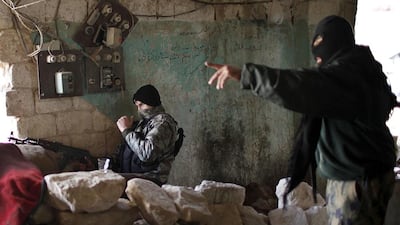In a recording released on Friday, Abu Mohammed Al Jolani, Jabhat Al Nusra’s leader, unveiled a plan for the group to start implementing sharia in Syria. The plan, if introduced, signals a departure from Jabhat Al Nusra’s policy of steering clear of imposing its ideology.
The move, which would include the establishment of an “Islamic emirate”, is evidently a reaction to the announcement of a caliphate last month by the Islamic State (formerly known as the Islamic State of Iraq and the Levant, or ISIL). But it is too simplistic to view the plan as a salvage operation to win back support from the Islamic State. It might also be a shrewd move by Jabhat Al Nusra to outmanoeuvre the Islamic State in a different sphere.
Throughout his speech, Al Jolani focused on countering the relevance of the Islamic State’s caliphate. He revealed a plan to form four emirates as part of one main emirate – two in the northern provinces of Idlib and Aleppo, one in the southern province of Deraa and one in the Ghouta area outside Damascus. What is striking about this strategy is that it does not include an emirate in eastern Syria. This could be an indication of a de facto surrender to the Islamic State in that part of the country.
The two groups will probably remain engaged in an open war of rhetoric to ensure survival, stability and expansion. But there are reasons to believe that they might eventually reach an understanding to divide the country between themselves: with Jabhat Al Nusra possibly holding to the north and south while the Islamic State controls the east. Consider for example how Jabhat Al Nusra refused to send a back up to the eastern province of Deir Ezzor despite repeated appeals from its members in the province. The Islamic State managed to take over what had been perceived as Jabhat Al Nusra’s stronghold in the east, the town of Shuhail.
Al Jolani directed his speech at jihadists who might be drifting towards the Islamic State by virtue of the idea of a caliphate. To counter its appeal, he focused on jihad for the sake of jihad, a concept that appeals to those who believe that no Islamic state or caliphate will endure within the current international order. According to this thinking, before the establishment of a caliphate the world order must be challenged at its core.
This idea will help Jabhat Al Nusra to coexist alongside the Islamic State within the jihadi landscape, competing for influence through two different ideas that appeal to subtly different audiences. Jabhat Al Nusra cannot rival the Islamic State in the statehood department, simply because more extreme groups and adherents rarely revert to less radical ones – in fact, the reverse is usually true. But it might have figured out a better way to compete with the Islamic State. This attempt by Jabhat Al Nusra represents an ideological coup to make it even more relevant for jihadists.
The group has since tried to ground its idea in the original global jihadi movement that began in Afghanistan – it sought support from the Taliban leader Mullah Omar, Al Qaeda and acclaimed jihadi ideologues such as Abu Mohammed Al Maqdisi and Abu Qatada, who all rejected the Islamic State’s caliphate declaration as counterproductive to jihad.
Such jihadists believe that their role is to serve as a “trigger” for a popular jihad in which the Muslim masses are involved in an armed resistance. In his talk, Al Jolani tried to position his group as the one that offers this choice: he said “Israel is only a stone’s throw away” and that “the US is forever weak ... thanks to your jihad”. He added that apart from the planned four emirates, the group would form an army that moves between these areas, an army he said would be the nexus of a future Muslim army.
Jabhat Al Nusra’s project is likely to undo much of what it has achieved over the past three years. The plan has raised eyebrows among its allies who have long seen it as different from the Islamic State, with some appealing to the group to reverse the idea. The plan will mean that the group will have to micromanage areas under its control, instead of its old policy of partnership and providing guidance and support to local forces to self-govern.
A noticeable trend over the past few days has been the transfer of Jabhat Al Nusra’s members from Deir Ezzor to Deraa. This migration is significant as it will shape the next chapter in Jabhat Al Nusra’s relationship with other groups.
“Deraa will be the practical start of the project of an emirate and a real test for Al Nusra’s ability to behave as an authority,” said Ahmed Abazid, a prominent researcher of Islamic groups in Syria.
Deraa was the site of the first high-profile tension between Jabhat Al Nusra and the Free Syrian Army, when, in April, it abducted an FSA commander after he made statements asserting that extremists have no place in future Syria. At the time, I wrote that it was easy to see that Jabhat Al Nusra was on a “downwards trajectory in terms of self-restraint and misrepresentation of its future goals in Syria”.
Meanwhile, the two jihadi groups have thrived in an environment of extreme violence in Syria, where they have had the opportunity, resources and time, and benefited from the failure of the outside powers to help the more moderate forces gain ground and popularity.
Hassan Hassan is a research associate with the Delma Institute in Abu Dhabi
Follow on Twitter: @hxhassan

